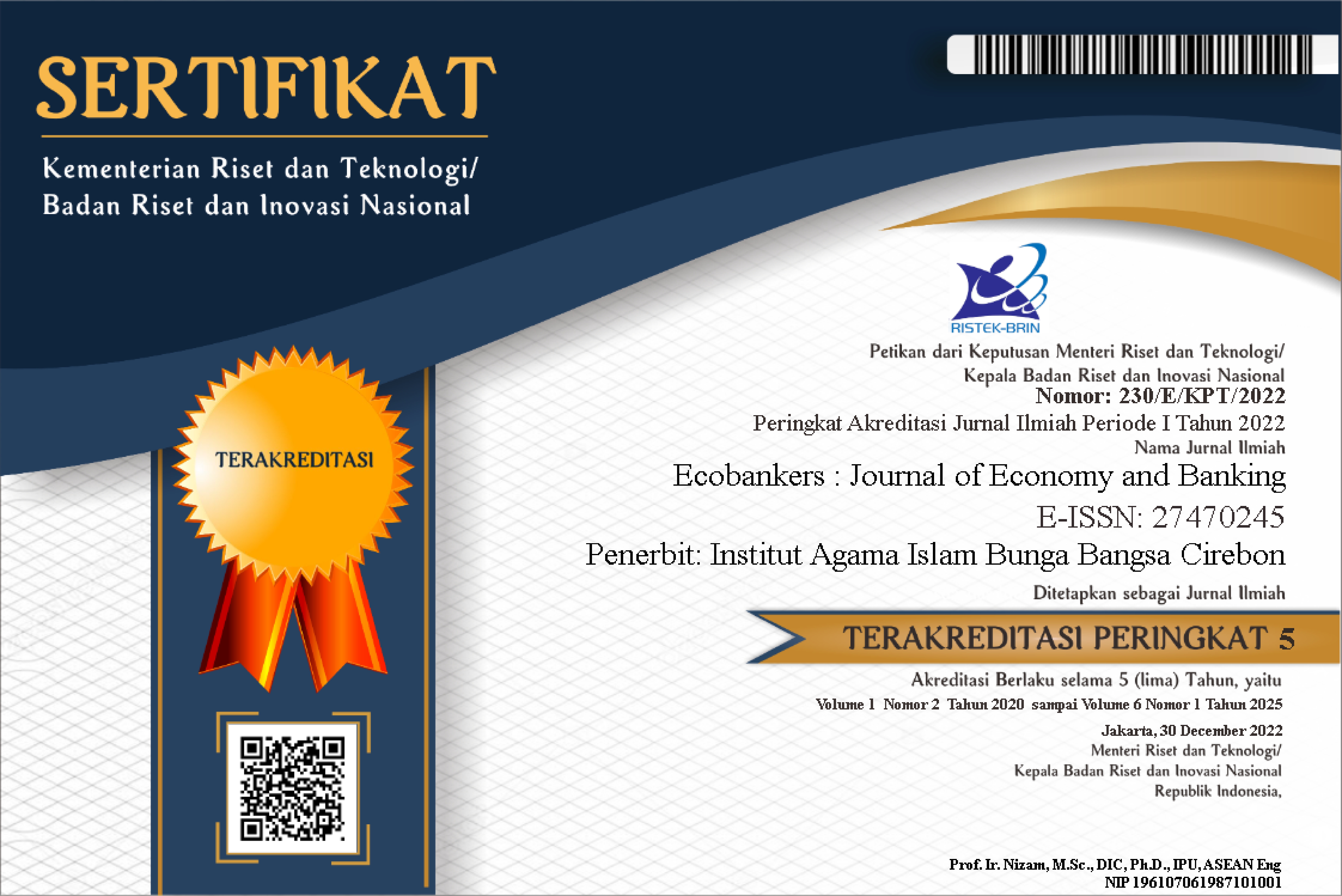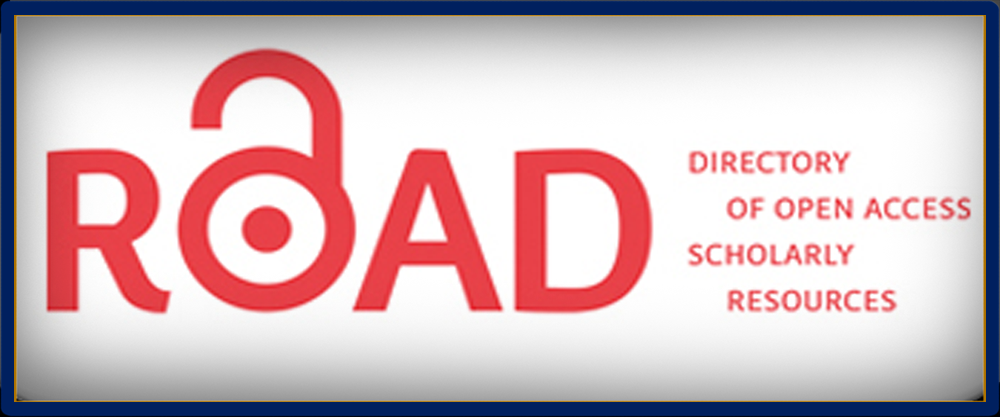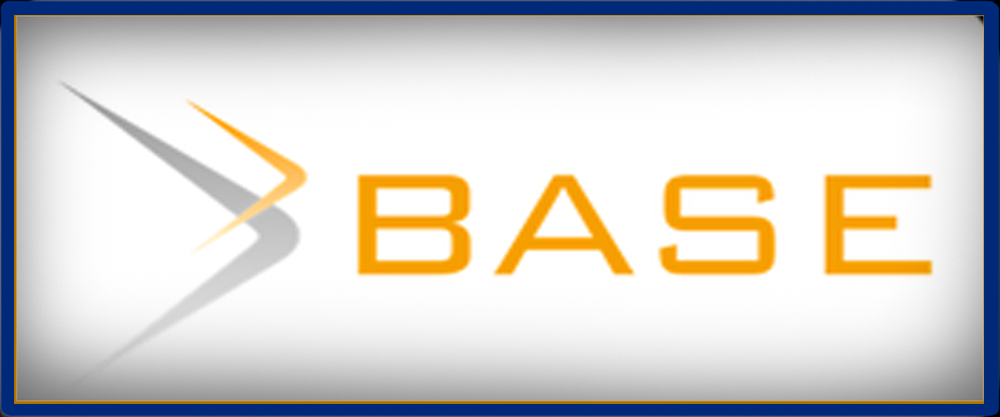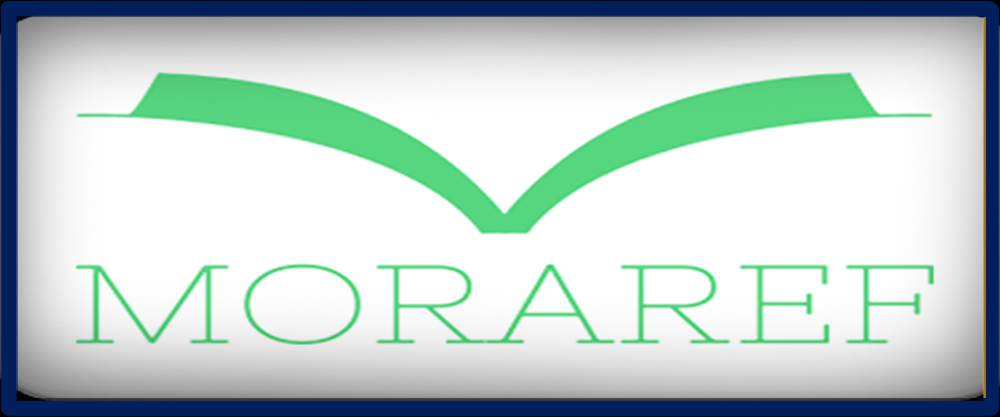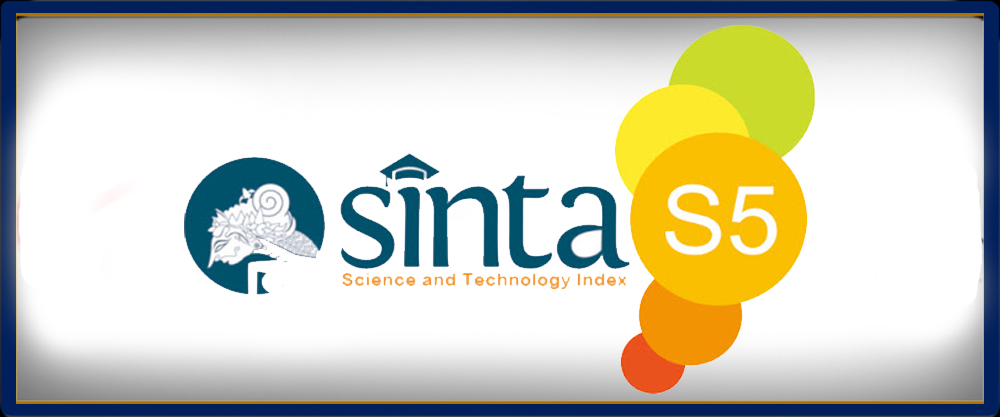Dinamika Perbankan Syariah dalam Prinsip Maqasid Shariah dan Laporan Kinerja Keuangan
Abstract
This research discusses the dynamics of Islamic banking as a financial institution as well as an institution that applies the principles of Maqasid Sharia in running its business. The methodology used in this research is a qualitative descriptive analysis by exploring the literature and building an understanding of the dynamics of Islamic banking. The findings in this study explain that Islamic banking must be consistent in applying the values of the Maqasid Sharia principles (building justice, building education, and improving public welfare) which in turn will increase public trust and have a positive impact on people's financial performance. Islamic banking.
Abstrak
Penelitian ini membahas tentang dinamika perbankan syariah sebagai lembaga keuangan sekaligus sebagai lembaga yang menerapkan prinsip maqasid shariah dalam menjalankan bisnisnya. Metodologi yang digunakan dalam penelitian ini menggunakan analisis diskripsi kualitatif dengan menggali studi pustaka dan membangun pemahaman tentang dinamika perbankan syariah. Hasil yang ditemukan dalam penelitian ini menerangkan bahwa perbankan syariah harus konsisten dalam menerapkan nilai-nilai prinsip maqasid shariah (membangun keadilan, membangun pendidikan dan meningkatkan kesejahteraan sosial) yang pada akhirnya akan meningkatkan kepercayaan masyarakat dan berdampak positif terhadap kinerja keuangan perbankan syariah.
Downloads
References
Asyraf Wajdi Dusuki, “Understanding the Objectives of Islamic Banking: A Survey of Stakeholders' Perspectivesâ€, International Journal of Islamic and Middle Eastern Finance and Management; Vol.1, Issue 2, (2008).
M. Umer Chapra, Islam and Economic Development , (New Delhi: Adam Publishers & Distributors, 2007).
Raja Irfan Sabir,et al. “Difference Between Islamic Banks and Commercial Banks Performance In Pakistanâ€, Journal International Review of Management and Business Research Vol. 3 Issue.2, (2014).
Salman Syed Ali, “Islamic Banking in the MENA Regionâ€, Paper Islamic Development Bank – Islamic Research and Training Institute (2011), 39-40.
Muhammad Hanif and Abdullah Muhammad Iqbal, “Islamic Financing and Business Framework: A Surveyâ€, European Journal of Social Sciences Vol 15, 4 (2010), 14-15.
Mustafa Omar Mohammed,et al, “Consumers’ Acceptance on Islamic Home Financing: Empirical Evidence on Bai Bithaman Ajil (BBA) in Malaysiaâ€, Paper Presented At Iium International Accounting Conference IV (INTAV), Marriot Putrajaya Hotel 24-26 (June 2008).
Tariqullah Khan, “Demand For and Supply of Mark-Up and PLS Funds In Islamic Banking: Some Alternative Explanationsâ€, Paper Islamic Research and Training Institute, Islamic Development Bank (2006).
Mohammad Omar Farooq, “Partnership, Equity-Financing and Islamic Finance: Whither Profit-Loss Sharing?â€, Review of Islamic Economics, Vol. 11 Special Issue (2007), 86-87.
Khan Zargham Ullah, “An Investigation of the Selection Criteria of Islamic Banking in Pakistan: Customers’ Perspectiveâ€, Research Journal of Management Sciences, Vol. 3,6 (2014), 7-9.
Rita Komaladewi, “Consumer Knowledge on Islamic Banking: Evidence from Indonesiaâ€, Journal Islamic Economic, Vol 22, 2 (2009).
Mohammad Faisal,et al, “Awareness Of Islamic Banking In India- An Empirical Studyâ€, Journal of Management Research 4, 1 (2008), 13-27.
Shabir Ahmad Hakim,et al, “Advertising Of Islamic Banking Productsâ€, Journal Annals of Management Research, Vol. 1, 2 (2011), 60-69.
Nasir Imtiaz,et al, “Factors Affecting The Individual’s Behavior Towards Islamic Banking In Pakistan: An Empirical Studyâ€, Journal Educational Research International Vol.1,2 (2013), 106-110.
Muhammad Mazhar Manzoor,et al, “Factors Paving the Way Towards Islamic Banking in Pakistanâ€, Journal World Academy of Science, Engineering and Technology Vol.66 (2010).
Shahzad Khan, “Factors Responsible For Making Consumer Attitude Towards Islamic Banking (A Study of Islamic Banks Accountholders of Peshawar Region Pakistan)â€, Arabian Journal of Business and Management Review (Oman Chapter) Vol. 2, No.1 (2012), 136-146.
Ahmad Mustofa, at.all, Reorientasi Ekonomi Syariah, (Yogyakarta: UII Press, 2014) 155-182.
Mohamad Yazid, at.all, “The Practices of Islamic Finance in Upholding the Islamic Values and the Maqasid al-shari‘ahâ€, International Review of Management and Business Research Vol. 4, 1 (2015).
Mehmet Asutay, “Conceptualisation of The Second Best Solution in Overcoming The Social Failure of Islamic Banking and Finance: Examining The Overpowering of HomoIslamicus by Homoeconomicusâ€, IIUM Journal of Economics and Management 15, no. 2 (2007): 167-195.
Ahmad Buchori, “Siap-siap, Uang Muka KPR Syariah Bakal Turun Jadi 25 Persenâ€, CNN Indonesia News, edisi 13 Maret 2015, accessed 16 September 2015, http://www.cnnIndonesia.com/ekonomi/20150313082728-92-38854/siap-siap-uang-muka-kpr-syariah-bakal-turun-jadi-25-persen/.
Otoritas Jasa Keuangan (OJK), Statistik Perbankan Syariah, edisi Maret 2015, lihat: http://www.ojk.go.id/statistik-perbankan-syariah-maret-2015.
Aji Dedi Mulawarman, “Target 5% Bank Syari’ah: Untuk Mashlaha?â€, Seminar Interaktif â€Shari’ah Weekendâ€, diadakan LEM FE-UII dan KOPMA FE UII, Jogjakarta, 13 Desember 2007, lihat https://ajidedim.wordpress.com/ekonomi-Islam/1-kritik-market-share-5-bank-syariah/.
Otoritas Jasa Keuangan (OJK), Statistik Perbankan Syariah, edisi Maret 2015, lihat: http://www.ojk.go.id/statistik-perbankan-syariah-maret-2015.
Nus Sechafia, at.all, “What Drives An Ideal Islamic Finance? A Maqasid Compliance Approachâ€, Proceedings of International Business and Social Sciences and Research Conference 16 - 17 December 2013, Hotel Mariiott Casamagna, Cancun, Mexico.
Kangarlouei, at al, “The Investigation of the Impact of Ownership Concentration on Financial Performance Measurement Criteria and Market Value Addedâ€, International Journal of Economics and Management Sciences, 1, 9, (2012), 44-51.
Harahap S.S, “The Disclosure of Islamic Values - Annual Report: The Analysis of Bank Muamalat’s Annual Reportâ€, paper presented in the International Conference on Information System and Islam at the IIUM, Malaysia, (2002).
Hameed S.M.I, “The Need For Islamic Accounting Perception of Malaysian Muslims, Accountants, Academics on The Objective and Characteristics of Islamic Accountingâ€, Ph.D Thesis: University of Dundee (2000).
Ibrahim, "Alternative Disclosure & Performance Measures for Islamic Banks, Department of Accounting", International Islamic University Malaysia (2006).
Haniffa, R, “Social Reporting Disclosure: An Islamic Perspectiveâ€, Indonesian Management & Accounting Research,vol. 1, no. 2. (2002) 128-146.
AAOIFI, “Accounting and Auditing, Governance Standards for Islamic Financial Institutionsâ€, Manama: Accounting and Auditing Organization for Islamic Financial Institutions (2002).
Michael C. Jensen, “Value Maximization, Stakeholder Theory, and the Corporate Objective Functionâ€, Journal of Applied Corporate Finance, vol.14, 3 (2001).
Zulkifli Hasan, “Corporate Governance : Western And Islamic Perspectivesâ€, International Review of Business Research Papers, vol.5, no. 1 (2009) 277-293.
Houssemeddine Bedoui dan Walid Mansour, “Islamic Banks Performance And Maqa>s}id al-shari>‘ahâ€, Paper presented to the 9th Asia-Pacific Economic Association Conference July 27-28, 2013 - Osaka, Japan.
Umar Chapra, “The future of Islamic economicsâ€, Speech presented at the Workshop on the Future of Islamic Economics, November 12-13, Jeddah, Saudi Arabia (2012).
Muhammad Akram Laidin, “The Shari’ah Objectives (Maqasid) In Contemporary Sciences†(2007), Accessed: 07 September 2015, lihat : http://www.amanie-iconnect.com/component/k2/item/32-the-shari%E2%80%99ah-objectives-maqasidin-contemporary-sciences.
Muhammad Azizul Islam, “Social and Environmental Reporting Practices of Organisations Operating in, or Sourcing Products from, a Developing Country: Evidence from Bangladeshâ€, A Thesis Submitted in Fulfilment of the Requirements for the Degree of Doctor of Philosophy, School of Accounting and Law RMIT Business RMIT University (2009).
Suchman, M.C., “Managing legitimacy: Strategic and Institutional Approachesâ€, Academy of Management Review, Vol. 20 No.3 (1995), 571-610.
Craig Deegan, “The Legitimizing effect of Social and Environmental Disclosures: A Theoretical Foundationâ€, Accounting, Auditing & Accountability Journal, Vol. 15, No. 3, (2002),282–311.
Guthrie J. And Parker L.D, “Corporate Social Reporting: A Rebuttal of Legitimacy Theoryâ€, Accounting and Business Research, 19, 76, (1989) 343-352.
Martin Reginald Mathews, “Social and Environmental Accounting: A Practical Demonstration of Ethical Concern?, Journal of Business Ethics, 14, 8, (1995), 663-671.
Roszaini Haniffa and Mohammad Hudaib, “Exploring the Ethical Identity of Islamic Banks via Communication in Annual Reportsâ€, Journal of Business Ethics, 76 (2007) 97–116.
Umaru M. Zubairu at, al, “Evaluation of Social Reporting Practices of Islamic Banks in Saudi Arabiaâ€, Electronic Journal of Business Ethics and Organization Studies, vol.17, 1 (2012).
Adiwarman A. Karim , Ekonomi Mikro Islam, ed. 4, 5 ( Jakarta: Rajawali Pers, 2012) 33-42.
Monzer Kahf, Al-Iqtisad al-Islami (The Islamic Economics), ed. 2, (Kuwait: Daar al-Qalam, 1981), 28-30.
Scott D. Dyreng, at al, “Religious Social Norms and Corporate Financial Reportingâ€, Journal of Business Finance & Accounting 39.7â€8 (2012): 845-875.
McGuire, at al, “The impact of religion on financial reporting irregularitiesâ€, The Accounting Review 87.2 (2011): 645-673.
Dan W. Hess, “The Impact of Religiosity on Personal Financial Decisionsâ€, Journal of Religion and Society, 14 (2012).
David W. Miller and Ewast Timothy, “Rethinking the Impact of Religion on Business Values: Understanding its Reemergence and Measuring its Manifestationsâ€, Journal of International Business Ethics, vol. 3, 2 (2010).
Zainab A. Ahmed and Bob Ryan, “Religion and cultural dimensions of trust in the emerging financial market in Libyaâ€, International Journal of Behavioural Accounting and Finance, 2.3-4 (2011) 208-224.
Tao Shu, Johan Sulaeman, and P. Eric Yeung, “Local Religious Beliefs and Mutual Fund Risk-Taking Behaviorsâ€, Management Science 58, 10, (2012).
Jeffrey L. Callen, at al, “Do Culture and Religion Mitigate Earnings Management? Evidence from a Cross-Country Analysisâ€, International Journal of Disclosure and Governance Vol. 8, 2 (2011) 103–121.


